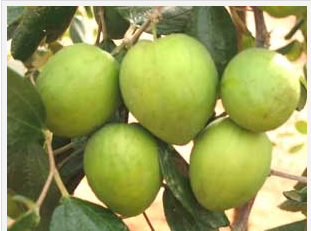La Pomme du Sahel, or Apple of the Sahel, is a fairly simple solution to a complex problem. The tree is native to the western Sahel desert, throughout Niger and Burkina Faso. On the windswept and heavily degraded soils of the Sahel, it is one of the few hardy trees that can survive and produce fruit. That makes it a crucial part of initiatives underway across the region to use trees to help restore the health of soil damaged by overgrazing and the clearing of perennial vegetation.

Often called Jujube, the wild tree produces a fruit that is small and difficult to eat, and tastes similar to a pineapple. Farmers, however, have largely overlooked the trees growing on their land because they consider its fruit fit only for consumption by goats. But the Jujube has been domesticated in India and the trees there produce a fruit ten times as big and much sweeter.
Sensing a possibility to combine the wild variety’s adaptation to the soil with the domesticated variety’s preferable fruit, Dov Pasternak formerly of the International Crops Research Institute for the Semi-Arid Tropics (ICRISAT) began grafting the two varieties together. Grafting is done by splicing the top of one plant onto the roots of another. The resulting plants cannot reproduce, however, so each tree must be spliced individually (video in French).
Each spliced tree can produce 20 kilograms of fruit that can be sold for USD$1 per kilogram. The fruit is sweeter, more like an apple, and high in vitamins A and C. Still saddled with the name Jujube, many farmers were uninterested in the new fruit, so Pasternak has rebranded the fruit as the Pomme du Sahel.
The rejuvenated tree has much to offer. Its bigger and more nutritious fruit offers an immediately appreciable boost to farmer’s yields, and its cultivation will help to restore fertility to the region’s soils. But Pasternak sees its benefit primarily in economic terms. “Farmers,” he says, “go hungry not because of drought but because there isn’t money to buy food.” The Pomme du Sahel is a part of ICRISAT’s Africa Market Garden program to develop farming techniques and plant varieties that will allow farmers to grow commercially viable produce. The program hopes that its efforts will boost yields and incomes for farmers in the unforgiving Sahel.
By Jeffrey Lamoureux
To purchase State of the World 2011: Innovations that Nourish the Planet please click HERE. And to watch the one minute book trailer, click HERE.

Danielle Nierenberg, an expert on livestock and sustainability, currently serves as Project Director of State of World 2011 for the Worldwatch Institute, a Washington, DC-based environmental think tank. Her knowledge of factory farming and its global spread and sustainable agriculture has been cited widely in the New York Times Magazine, the International Herald Tribune, the Washington Post, and
other publications.
Danielle worked for two years as a Peace Corps volunteer in the Dominican Republic. She is currently traveling across Africa looking at innovations that are working to alleviate hunger and poverty and blogging everyday at Worldwatch Institute’s Nourishing the Planet. She has a regular column with the Mail & Guardian, the Kansas City Star, and the Huffington Post and her writing was been featured in newspapers across Africa including the Cape Town Argus, the Zambia Daily Mail, Coast Week (Kenya), and other African publications. She holds an M.S. in agriculture, food, and environment from Tufts University and a B.A. in environmental policy from Monmouth College.








